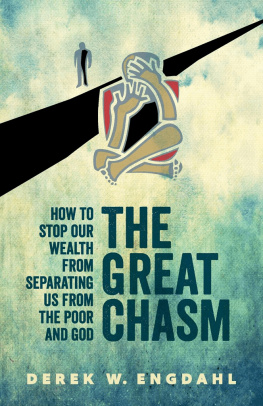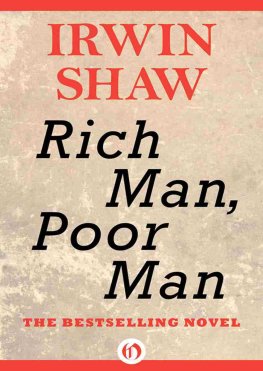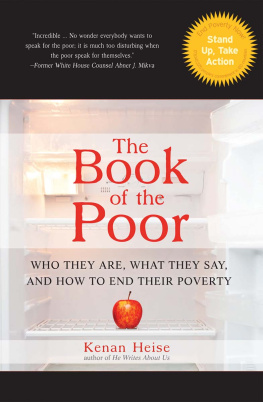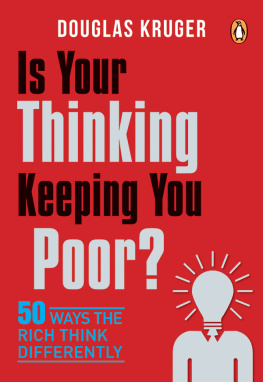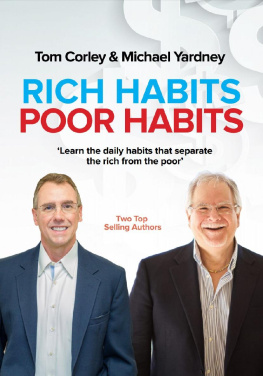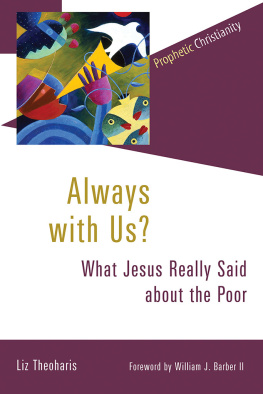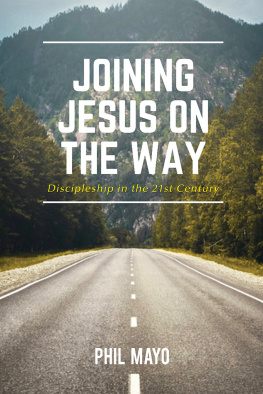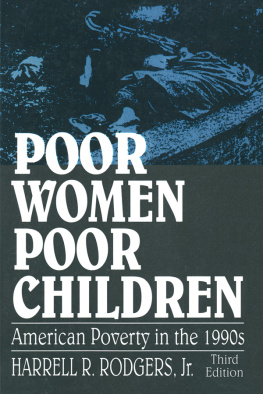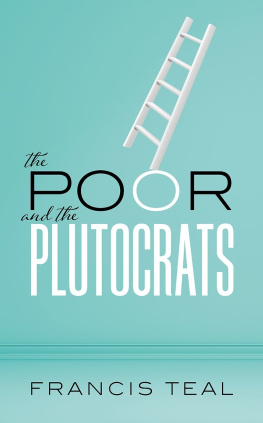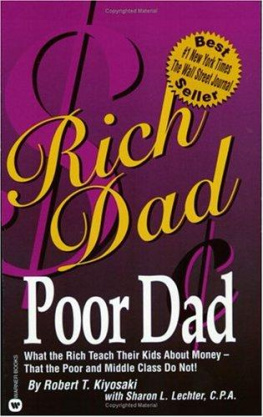The Great Chasm has dressed up Lazarus and the rich man in 21st century clothing. In doing so, this book has uncovered something of our own poverty. After years of sojourning with those on the margins, Derek Engdahl has earned the right to do some exegesis from the edges. He tells stories from his experiences in a way that bring Lukes manuscript into focus. We are given lucid prose to see afresh how it relates to our world today. The Great Chasm is a work which will help close todays chasm between rich and poor.
SCOTT BESSENECKER, ASSOCIATE DIRECTOR OF MISSIONS FOR INTERVARSITY CHRISTIAN FELLOWSHIP AND AUTHOR OF THE NEW FRIARS: THE EMERGING MOVEMENT SERVING THE WORLDS POOR
As idealistic justice-makers, we encounter complex bridge-crossing experiences as we enter into the midst of global poverty. Derek has anchored reflections on these issues in a solid Biblical exegesis, providing a platform for genuine economic divide-crossing spiritualities. He does us this service from his years of leadership of engagement with the issues globally with Servant Partners, built on an Intervarsity background of digging deep in the Word of God.
VIV GRIGG, INTERNATIONAL DIRECTOR, MA IN TRANSFORMATIONAL URBAN LEADERSHIP, AZUSA PACIFIC SEMINARY AND AUTHOR OF CRY OF THE URBAN POOR
Great books arent merely written by authors but written into the hearts and souls of the people authoring them. Derek Engdahl is a great author and The Great Chasm is a great booknot only because of what Derek illuminates about the Gospel of Luke, but how these truths are embodied and reflected in the way Derek lives, loves, and services the world. You can trust that as you flip through these pages, a holy imagination emerges from the credibility of a life well-lived.
CHRISTOPHER L. HEUERTZ, CO-FOUNDER OF GRAVITY, A CENTER FOR CONTEMPLATIVE ACTIVISM AND AUTHOR OF UNEXPECTED GIFTS: DISCOVERING THE WAY OF COMMUNITY.
This book isnt for everyoneonly people who own some money. Although you dont need much of it to profit from Engdahls wisdom. Engdahls stories and insights into Scripture challenged me, motivated me, and encouraged me. An investment in The Great Chasm will yield rich benefits.
DAVID T. LAMB, ASSOCIATE PROFESSOR OF OLD TESTAMENT, BIBLICAL THEOLOGICAL SEMINARY AND AUTHOR OF God Behaving Badly: Is the God of the Old Testament Angry, Sexist and Racist?
Derek Engdahl challenges our lives of comfort by drawing on the scriptures that likewise challenge our comfortable lifestyles. Integrating many compelling stories, he calls us to take wealth and poverty seriously, just as the Bible does. If you desire to see the gospel lived out and the chasm between rich and poor bridged, read this book.
JUDE TIERSMA WATSON, ASSOCIATE PROFESSOR OF URBAN MISSION IN FULLER SEMINARYS SCHOOL OF INTERCULTURAL STUDIES. SHE LIVES IN A STRUGGLING IMMIGRANT NEIGHBORHOOD IN LOS ANGELES AS A MEMBER OF INNERCHANGE/CRM.
THE GREAT CHASM
THE GREAT CHASM
HOW TO STOP OUR WEALTH FROM SEPARATING US FROM THE POOR AND GOD
DEREK W. ENGDAHL

The Great Chasm. Copyright 2015 by Derek W. Engdahl.
All rights reserved.
Servant Partners Press
P.O. Box 3144
Pomona, CA 91769
www.servantpartners.org
Servant Partners is an interdenominational evangelical missions agency that sends, trains, and equips those who follow Jesus by living among the worlds urban poor. By the power of the Holy Spirit, we seek the transformation of communities with the urban poor through church planting, community organizing, and leadership development.
Cover design: Loren A. Roberts/HearkenCreative
Cover art: Derek W. Engdahl
Published in association with Samizdat Creative, a division of Samizdat Publishing Group (samizdatcreative.com)
The interviews for this book were conducted by the author between 2008 and 2013 and are used by permission.
All Scripture quotations, unless otherwise noted, are taken from the New Revised Standard Version of the Bible, copyright 1989 by the Division of Christian Education of the National Council of the Churches of Christ in the U.S.A.; used by permission.
ISBN 13: 978-0-692514-96-2 (ebook)
CONTENTS
For my wife, Lisa
ACKNOWLEDGEMENTS
T HE TOPICS OF WEALTH, POVERTY, THE RICH, AND THE POOR ARE dauntingly complex. I have learned a great deal from those who have been addressing these issues for decades and have been willing to pass on some of their understanding to me either personally or in books. I am grateful for the mentor-ship and instruction of Robert Linthicum as well as Viv Grigg. John Perkins, who was living in a poor community near my college when I was a student, challenged me to relocate and learn to reconcile with people different from myself. I ran into Jim Wallis at a conference this past year and was able to thank him for his book The Call to Conversion, which was so important to my early wrestling with these topics. Jacques Ellul forever changed my view of wealth with his book Money and Power. I am not planning on running into him soon, and so my personal thanks will have to wait.
In this book, I deal significantly with the idea of grace and how it directs us away from self-justification but toward obedience. There is no one to whom I am more indebted for my understanding of this than Daniel Fuller. He caused me to dig deeply into Pauls letter to the Galatians which has become the central scripture of my life. Though the letter has little to do directly with the main subject of this book, its theology, and Dans teaching, could not help but seep into my writing.
As I have struggled with the best way to deal with systemic change and the empowerment of the poor, I have appreciated the mentorship of several community organizers including Sr. Judy Donovan, Ken Fujimoto, and Rebecca Gifford.
My parents, Dick and Brenda, were the first to model generosity and simplicity to me. Though living on a pastors salary meant that our lifestyle was different than most of our friends, my childhood was in no way marred because they chose not to buy me the genuine Members Only jacket or OP corduroy shorts (I realize I am dating myself). They were sacrificially generous with their time and the resources they had. My childhood made me realize that happiness does not consist in the excess of things or in storing up wealth for some future enjoyment. Even now in retirement, my parents continue to give all they can to their children and grandchildren.
I am grateful for all of the people I have worked with over the past sixteen years I have been with Servant Partners. I am sure I have learned more from them than I am even completely aware. My thanks to those whose ministry and personal stories I have used in the book; Trevor Davies, Jean Luc Krieg, Chris Rattay, Sara Stephens, Chris and Maureen Hodge, and Tom and Bree Hsieh. I am particularly thankful for those Servant Partners staff who have studied Luke 15 and 16 with me every year for the past ten years as part of their orientation. Though I was supposed to be their teacher, every class gave me some new insight into the text that forms the framework for this book. For the past number of years, we have studied it together in the sweltering heat of South East Asia, bombarded by the distractions that only a squatter community can provide. These conditions were never ideal for academic focus, but it has seemed appropriate to live among the poor while we wrestle with what Jesus says about them. The idea for this book came from one of those studies.
Next page
